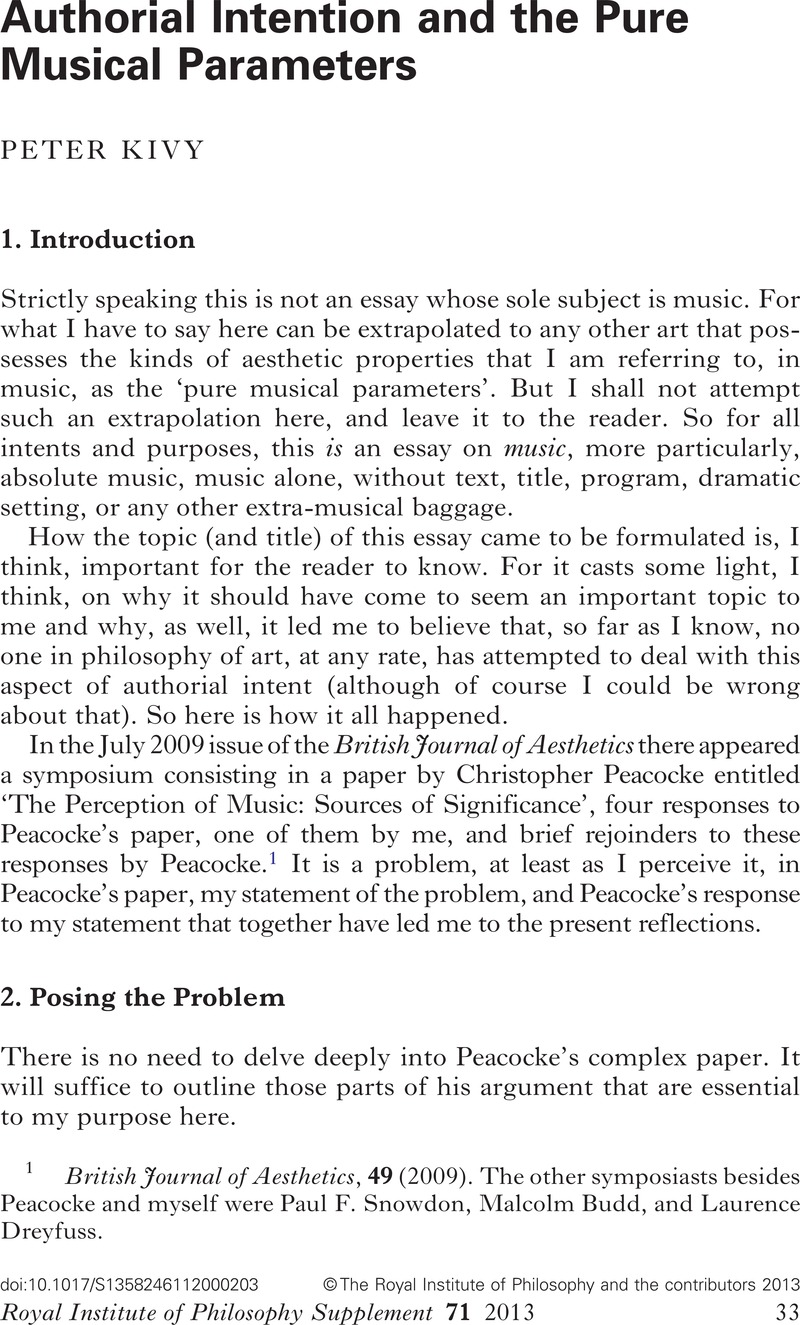No CrossRef data available.
Article contents
Authorial Intention and the Pure Musical Parameters
Published online by Cambridge University Press: 11 March 2013
Abstract

- Type
- Papers
- Information
- Royal Institute of Philosophy Supplements , Volume 71: Philosophy and the Arts , October 2012 , pp. 33 - 50
- Copyright
- Copyright © The Royal Institute of Philosophy and the contributors 2013
References
1 British Journal of Aesthetics, 49 (2009)Google Scholar. The other symposiasts besides Peacocke and myself were Paul F. Snowdon, Malcolm Budd, and Laurence Dreyfuss.
2 Peacocke, Christopher, ‘The Perception of Music: Sources of Significance,’ British Journal of Aesthetics, 49 (2009), 257CrossRefGoogle Scholar.
3 Ibid., 260.
4 Ibid., 265; emphasis mine.
5 McClary, Susan, ‘The Blasphemy of Talking Politics during Bach Year’, in Leppert, R. and McClary, S. (eds), Music and Society: Politics of Performance and Reception (Cambridge: Cambridge University Press, 1987), 4Google Scholar, quoted in Peacocke, ‘The Perception of Music’, 266.
6 Peacocke, ‘The Perception of Music’, 266.
7 Ibid., 274.
8 Ibid.
9 Ibid., 275.
10 Peacocke, Christopher, ‘What Is the Role of Authorial Intention in Determining the Correct Way to Hear a Piece of Music?’, British Journal of Aesthetics, 49 (2009), 304Google Scholar.
11 Ibid., 305.
12 Kerman, Joseph, The Beethoven Quartets (New York: Alfred A. Knopf, 1967), 343Google Scholar.
13 Peacocke, ‘What Is the Role of Authorial Intention in Determining the Correct Way to Hear a Piece of Music?’, 305.
14 Ibid.
15 See Kivy, Peter, The Possessor and the Possessed: Handel, Mozart, Beethoven, and the Idea of Musical Genius (New Haven: Yale University Press, 2001)CrossRefGoogle Scholar, passim.
16 Ibid.
17 Peacocke, ‘What Is the Role of Authorial Intention in Determining the Correct Way to Hear a Piece of Music’, 305.
18 Grice, Paul, Studies in the Way of Words (Cambridge, Mass. and London: Harvard University Press, 1989), 137Google Scholar.
19 Ibid., 222.
20 Ibid.
21 Wollheim, Richard, The Mind and its Depths (Cambridge, Mass.: Harvard University Press, 1993), 188–189Google Scholar.
22 These thought experiments were set in train by a question posed to me by Hong Yu Wong during the discussion period following the presentation of this chapter as a lecture to the Royal Institute of Philosophy, London, 12 November, 2010.
23 I am thinking particularly of the passage which reads, in part: ‘…I desire anyone to lay his hand upon his heart, and after a serious consideration, whether he thinks that the falsehood of such a book, supported by such a testimony, would be more extraordinary and miraculous than all the miracles it relates…’ See. Hume, David, An Enquiry Concerning Human Understanding, ed. Steinberg, Eric (2nd ed.; Indianapolis and Cambridge: Hackett, 1993), 90 (Section X)Google Scholar.
24 I am leaving out of consideration here biological functions, such as the ‘function’ of the heart to pump blood, the ‘function’ of the kidneys to do whatever it is they do, and so on. The analysis of biological function is, of course, tied to the theory of evolution and natural selection, and is irrelevant to present concerns, which are, of course, about ‘crafted’, man-made objects, for which the generalization ‘no function without a giver of the function’ still holds, intentionless biological function notwithstanding.




